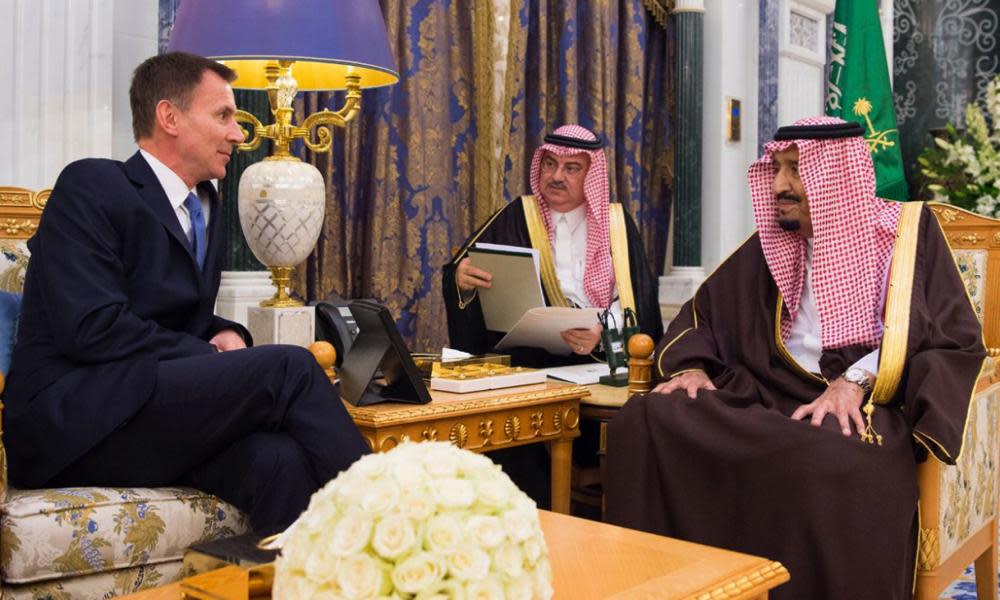UK increases pressure on Saudis and UAE in Yemen ceasefire bid

Saudi Arabian leaders have been put under intense Western pressure to agree to a ceasefire in Yemen and open the path for political talks by ensuring the obstacles placed in the way of a previous round of UN sponsored talks are not replicated.
As the joint Saudi-United Arab Emirates (UAE) offensive on the strategic port of Hodeidah continues, the UK foreign secretary, Jeremy Hunt, urged the Saudis not to risk a humanitarian disaster in pursuit of military victory.
Hunt, speaking during a visit to Riyadh, said there was “a short window to make a difference” adding “right now we are witnessing a man-made humanitarian catastrophe”.
His visit coincided with a lull in Saudi airstrikes, after estimates suggested as many as 150 people had been killed in air raids on Hodeidah in the previous 24 hours.
The Saudi-commanded forces are now within sight of the cranes of the Red Sea port which they have said the Iranian-backed Houthis used to smuggle through arms and impose taxes.
Western diplomats have been sceptical at Saudi insistence that it was not seeking to take the port city, but only to strengthen its negotiating position ahead of expected political talks.
Hunt later said that he believed there was a “real willingness” in Riyadh to start peace talks, and said that the Saudis seemed ready to remove some of the stumbling blocks which had previously stopped dialogue.
He also said he had been given assurances that proceedings would start very soon against those Saudi agents suspected of murdering Jamal Khashoggi, the Washington Post columnist.
Hunt, speaking after a day of meetings in Saudi and the UAE, said: “Even though there has been a temporary lull in the fighting [in Hodeidah] there are 8.5 million people on the brink of starvation, there are 14,000 getting cholera every week and it is a desperate humanitarian situation”.
The UK has been circulating draft resolutions due to be submitted at the security council as early as this week setting the terms for political talks, including a range of confidence building measures.
Hunt said that the Saudis had agreed to allow the Houthi delegation to leave Sana’a by plane, and evacuate 50 wounded fighters who needed medical treatment.
Previous talks in Geneva were aborted after the Saudis blocked a similar request in September.
“This is potentially very significant since it has been one of the conditions the Houthis have made for their attendance on the peace talks, so if this unblocks that, it makes the prospect of peace talks happening that much more real,” Hunt said.
He called on the Houthi leaders to make similar steps to building confidence by ending missile strikes on the Saudi-led forces.
Before flying to Saudi Arabia, Hunt had consulted with his key American and European allies to ensure he was carrying a joint message. He was also backed by the UN secretary-general, António Guterres, who warned of a possible “catastrophic situation” if the port was destroyed.
“The fighting must stop, a political debate must begin, and we must prepare a massive humanitarian response to avoid the worst next year,” he said.
In France, the foreign minister, Jean-Yves Le Drian, said it was time “the international community said enough is enough. There will be no victor in this war.”
On a day of intense diplomacy, Hunt first met with Saudi King Salman and the foreign minister, Adel al Jubeir, in Riyadh before flying to the UAE to meet Abu Dhabi’s crown prince, Sheikh Mohammed bin Zayed Al Nahyan. Hunt then returned to Riyadh to meet the Saudi crown prince, Mohammed bin Salman, who has a preference for late meetings.
John Bolton, the US national security chief, also travelled to the UAE for talks.
Hunt has combined his ceasefire bid with a call for the Saudis to do more to act on the findings of the Turkish investigation into the murder of the Washington Post columnist Jamal Khashogggi, a critic of Saudi’s rulers.
Riyadh has now admitted that Khashoggi was killed in a premeditated murder in the Saudi consulate in Istanbul on 2 October. So far 15 members of the Saudi hit squad sent to Istanbul have been arrested along with three others. Five others, including four intelligence officials and a senior adviser to the royal court, were dismissed from their jobs.
Hunt said he had spoken frankly with his Saudi partners and demanded accountability for those responsible for the killing and those who ordered it.
He added: “I was led to believe there will be rapid progress ... and the legal processes [are] going to start very soon indeed and we should hear something about that shortly”.
Asked if the UK had been given access to a secret Turkish audio tape of Khashoggi’s murder, Hunt said: “We don’t comment on intelligence matters, but my understanding of what happened actually is not dissimilar to what I have read in the newspapers”.

 Yahoo News
Yahoo News 
